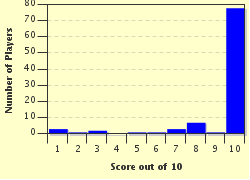Quiz Answer Key and Fun Facts
1. Take DXV away from DLVI - what is the answer in Roman numerals?
2. Divide XCIX by III - what is your answer in Roman numerals?
3. Multiply CV by IV to get what result in Roman numerals?
4. Add MCCXLI to CLXXXVI for which Roman numeral answer?
5. If we were to use Roman numerals in a more contemporary way, what is "X" percent of DCLX?
6. Remove DCCXV from CMXXXI to give which Roman notation answer?
7. Divide DCLXVIII by IV to give which Roman number answer?
8. Multiply LIX by VI for your next Roman numerals answer?
9. Add MMMDCCC to C to give which Roman numerals answer?
10. Captain Cook discovered the east coast of Australia in 1770. What date is this in Roman numerals?
Source: Author
Creedy
This quiz was reviewed by FunTrivia editor
trident before going online.
Any errors found in FunTrivia content are routinely corrected through our feedback system.


